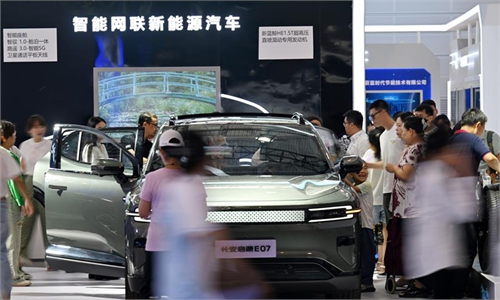China’s NEV boom drives shortage of over 1m professionals, sparks industry-academia partnership

Henan Daily
Zhengzhou: China’s booming new-energy vehicle (NEV) sector is creating massive talent demand across the industry chain, with projections showing a shortage of more than 1 million professionals this year. Specialized fields like intelligent driving engineering face particularly acute gaps, evidenced by a supply-demand ratio of just 0.38, according to the China Media Group (CMG).
To address this situation, major industry players are forging stronger industry-academia collaboration arrangements while leading manufacturers ramp up hiring initiatives. Experts said that this growing synergy between automakers and educational institutions is proving vital to bridging the talent gap, boosting employment, and sustaining the sector’s rapid growth momentum as China’s NEV industry continues its expansion.
Changan Automobile plans to increase its 2026 campus recruitment by more than 30 percent, focusing on core technical areas including intelligent systems, new-energy technologies, and software development, while strengthening partnerships with more than 20 universities, CMG reported.
XPeng Motors has announced plans to add 6,000 new employees in 2025, the Southern Daily reported.
BYD’s plant in Zhengzhou, Central China’s Henan Province, amid new project expansions and production line launches, aims to recruit 55,000 people in 2025, with nearly 20,000 positions already offered at a job fair in February, covering vehicle manufacturing, components and batteries, the Zhengzhou Daily reported.
The NEV industry is developing at a high speed, bringing new technological breakthroughs. In particular, various enterprises are in the process of realizing autonomy driving, which naturally leads to a shortage of talent in this field, Cui Dongshu, secretary-general of the China Passenger Car Association, told the Global Times on Sunday.
This will inevitably create a large number of employment opportunities, such as jobs for those familiar with software and the entire intelligent system, Cui said.
According to a projection from the Ministry of Industry and Information Technology, the workforce requirement in the energy-efficiency and NEV fields is expected to increase from 170,000 in 2015 to 1.2 million this year, and the projected talent gap this year is 1.03 million, according to the Xinhua News Agency.
In the first half of this year, NEV production stood at 6.97 million, up 41.4 percent year-on-year, while NEV sales reached 6.94 million, an increase of 40.3 percent. NEVs accounted for 44.3 percent of China’s total new car sales during the period, according to data released by the China Association of Automobile Manufacturers on Thursday.
The talent gap highlights both the industry’s accelerated growth and the urgency of talent cultivation, Zhang Xiang, secretary-general of the International Intelligent Vehicle Engineering Association, told the Global Times on Sunday.
“China’s NEV industry has maintained explosive growth. This rapid expansion has fueled intense demand for diverse talent, covering R&D, sales, management, and other critical domains. Notably, key components such as batteries, motors, and electronic control systems differ fundamentally from traditional fuel vehicles, leaving conventional engineers underqualified for these emerging fields,” Zhang said.
Educational institutions, auto companies, and regional governments are adapting through industry-academia collaboration to bridge the skills gap.
For example, Chongqing Polytechnic University of Electronic Technology exemplifies this approach through its integrated curriculum development. Its modular course structure allows specialization in emerging areas like vehicle-infrastructure-cloud systems, fostering interdisciplinary skills. These reforms are supported by deep partnerships with automotive leaders, extending beyond curriculum design to include joint research projects and technology development, the CMG reported.
BAIC Group in March launched a program to cultivate skilled professionals. Over the next three years, the company aims to create partnerships with 100 vocational schools, train 10,000 skilled workers for the NEV industry chain, and create more job opportunities across upstream and downstream sectors.
Qingdao in East China’s Shandong Province in January released an action plan aimed at promoting collaboration between vocational schools and enterprises to address the industry’s demand for skilled professionals in the intelligent and NEV sectors.
The integration of industry and education is an effective solution to the shortage of new-energy sector talent. Through school-enterprise collaboration, students gain access to the latest industry knowledge and hands-on experience via corporate lectures, study tours, and practical training. With enterprises involved in talent development, the trained personnel are better aligned with industry needs, offering robust support for the growth of the NEV sector, Zhang said.





